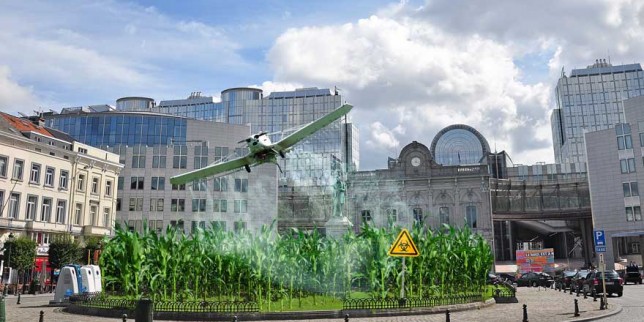Although an EU Commission decision on the cultivation of genetically engineered maize 1507 has been expected for several months, it has still not been published.

In the meantime, new information has become available indicating that the biotech industry is pulling out of the cultivation of transgenic crops in the EU. According to Testbiotech investigations, US companies have just recently quietly withdrawn four EU applications for the cultivation of genetically engineered plants.
Amongst others, the withdrawals were for two glyphosate-tolerant seeds marketed by Monsanto, soybean 40-3-2 (Roundup Ready soybean) and maize line NK603 (a variety made infamous by the Seralini 2012 study which was re-published last week).
This information has emerged from the minutes of a meeting of the „Standing Committee on genetically modified food and feed“ (SCFCAH). In this committee, representatives of EU member states meet to vote on applications for market authorisation of genetically engineered crops.
After these two withdrawals, there is only one Monsanto application for the cultivation of a transgenic plant left. This application is for the renewal of the maize MON 810 authorisation. MON 810 produces an insecticidal protein.
In addition, the register of the European Food Safety Agency (EFSA) shows that DuPont/Pioneer, another US company, has recently withdrawn two applications for the cultivation of genetically engineered maize lines 1507 x NK603 and 59122 x 1507 x NK603.
In 2013, Monsanto withdrew six applications for the cultivation of genetically engineered sugar beet and maize:
- maize MON89034 x MON88017;
- maize MON89034;
- maize MON89034 x NK603;
- maize NK603 x MON810;
- maize MON88017;
- sugar beet H7-1.
Consequently there are – in addition to maize MON810 – a further eight EU applications still pending for the cultivation of transgenic crops:
- maize 1507 by Pioneer (insect toxicity, herbicide tolerance);
- maize Bt11 by Syngenta (insect toxicity, herbicide tolerance);
- maize 59122 by Pioneer (insect toxicity, herbicide tolerance);
- maize 1507×59122 by Pioneer (insect toxicity, herbicide tolerance);
- maize GA21 by Syngenta (herbicide tolerance);
- maize MIR604 by Syngenta (insect toxicity);
- maize Bt11xMIR604xGA21 by Syngenta (insect toxicity, herbicide tolerance);
- cotton GHB614 by Bayer CropScience (herbicide tolerance).

















